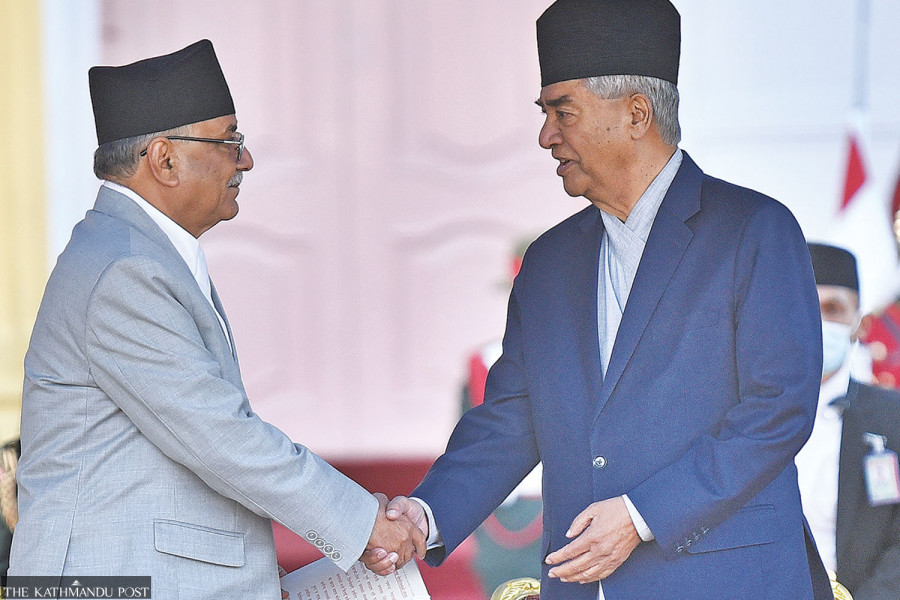Politics
Ruling alliance to strike power-sharing deal only after Dahal secures trust vote
Leaders say they are focussed on electing alliance’s candidates in the presidential polls.
Post Report
The much-awaited power-sharing deal among ruling parties will only be struck after Prime Minister Pushpa Kamal Dahal wins a vote of trust after the elections to the vice president scheduled for March 14. Since more parties are likely to join the eight-party alliance, the process of power-sharing deal will be delayed further, said party leaders.
“The prime minister will seek a vote of trust in the House of Representative after the elections to the president and vice president,” said Bimalendra Nidhi, a senior Nepali Congress leader. “The power sharing deal will be negotiated after the prime minister wins the vote of trust.”
Top leaders of major parties, including Prime Minister Dahal and President of Nepali Congress Sher Bahadur Deuba, have also agreed that election to the president and vice-president would be affected if power-sharing deal is discussed before the elections, a senior CPN (Maoist Centre) leader said.
“We will avoid power-sharing discussions until the presidential elections to ensure a comfortable victory for the ruling alliance candidates,” the Maoist leader said on condition of anonymity.
Haribol Gajurel, chief political adviser to Prime Minister Dahal, also said that the power-sharing deal will be discussed only after elections to the president and vice-president. Senior leader of the Nepali Congress Ram Chandra Paudel is contesting for the post of President from the ruling alliance against Subas Chandra Nembang of the CPN-UML. Nomination for the post of vice-president is yet to be announced.
The power-sharing issue has two dimensions, the Nepali Congress leader said. One is ministerial allocation in the central government and next is forming the provincial government at least in Koshi, Gandaki and Lumbini. All these three provinces are currently led by the UML’s chief ministers. The remaining four provinces—Madhesh, Bagmati, Karnali and Sudurpaschim—are already headed by the parties in the present ruling alliance. CPN (Maoist Centre) is leading the Bagmati and Karnali provinces while Nepali Congress is leading the Sudurpaschim province. The Chief Minister of Janata Samajbadi Party is leading the government in the Madhesh province. “We are hoping that Nepali Congress will lead two more provinces,” the Nepali Congress leader said. “Attempts are underway to lead the provincial governments in Karnali and Gandaki too.”
The Maoist leader said that the power-sharing deal will be forged in a package. “It will not focus only on cabinet expansion at the centre,” the leader added. “This time, the Maoist Centre is setting sight on some influential and powerful ministries like Home and Finance and it is certain that we will have very tough negotiations with the Nepali Congress.”
The task force of ruling parties was expected to discuss the possible power-sharing deal on Tuesday, but the meeting didn’t touch upon it, according to leaders. The task force only discussed how to ensure Paudel’s victory in the President’s election, they said.
Leaders said that since the number of the parties joining the ruling alliance is increasing, they are discussing how to manage the alliance better.
“We are discussing expanding the size and number of the present coalition,” said Beduram Bhusal, secretary general of CPN (Unified Socialist). “The number of ruling parties will reach 10 from eight.”
Party leaders of the ruling alliance have urged their respective lawmakers to reach Kathmandu by Wednesday afternoon. They are wary of potential cross-voting and have decided to cast their entire votes in favour of Paudel.
The ruling alliance has a weightage of over 31,500 electoral college votes so far, said Rajendra Shrestha, a Janata Samajbadi Party leader. “We are going to add more votes to this tally,” he said. “Rastriya Swatantra Party and Rastriya Prajatantra Party have yet to decide who to vote for but we are confident that Paudel will win the election.”




 22.12°C Kathmandu
22.12°C Kathmandu














